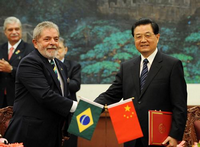Last week was a busy one for Brazilian President Luiz Inácio Lula da Silva. In one week, the Brazilian leader visited China, Saudi Arabia, and Turkey, on a tour intended to strengthen Brazil's diplomatic and economic ties with those three nations.
The three days Lula spent in China, from May 19-21, received more attention than the other legs of the trip, in large part due to the close economic ties between the two nations. Spurred by a mutual demand for each others' exports -- with China seeking Brazilian raw materials, and Brazil seeking Chinese manufacturing -- China is now the largest trading partner for South America's largest economy. That stands in contrast to much of the rest of Latin America, where the United States dominates trade.
During Lula's visit, Brazil and China signed a slew of economic deals to strengthen those ties. The largest was a $10-billion loan from the Chinese government to Petrobras, the Brazilian state-owned oil company. The cash infusion will go toward increasing oil production by more than half, and to exploring oil fields in Brazil and along the Brazilian coast over the next ten years. In a symbolic gesture, Brazil and China also announced that they would phase out the use of the dollar in bilateral trade.

